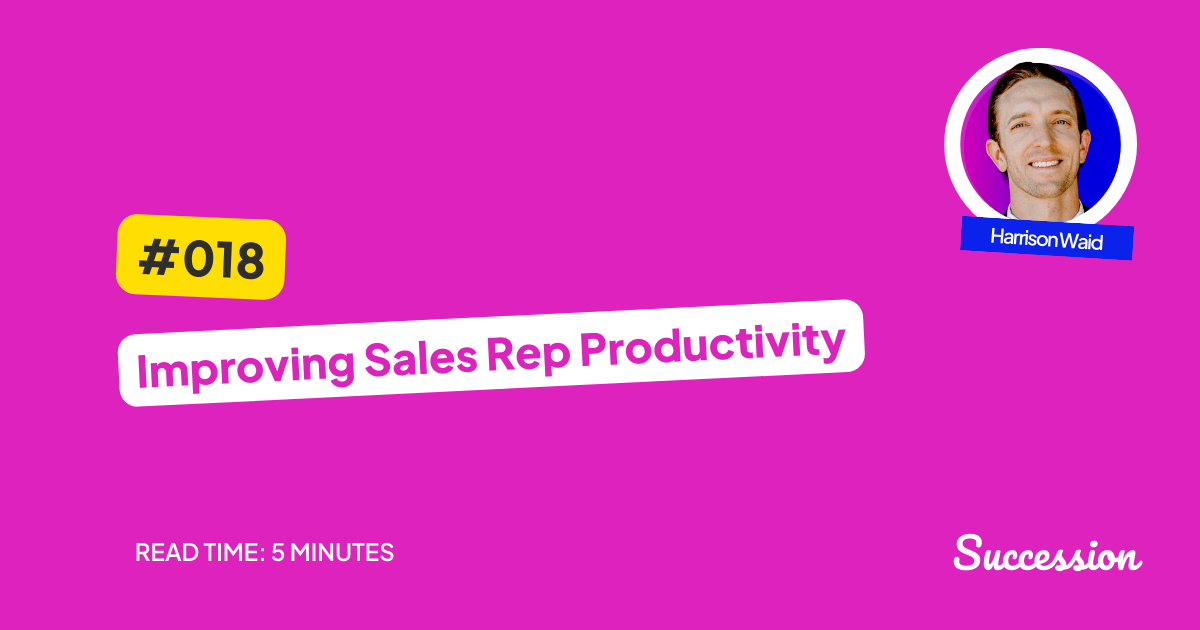Read time: 5 minutes
Welcome to the Succession newsletter where you will improve your life science sales skills in 5 minutes per week. If you’re getting value from these newsletters, we'd love it if you could forward it along to your sales colleagues. If you’re new here, subscribe below.
P.S. We launched the SalesDNA podcast! It’s a weekly interview show with the industry's top reps, leaders, and scientists. We’ve had incredible feedback so far. Give it a listen and let us know what you think.
If you’d like to be a guest, reach out and we can get you on the show.

2023 was a really tough year for sellers in the life sciences. Sales cycles were longer, win rates were down, and quota attainment was only 43%.
With smaller sales teams being asked to produce more, we need to arm our teams with the skills to sell in this complex environment.
We can’t keep doing the same things and expecting different results. The way we train and uplevel our sellers has to adapt to the new selling environment.
”The definition of insanity is doing the same thing over and over and expecting different results” - Albert Einstein.
To prevent insanity, here are 4 trends that need to change in 2024.
1: Sales training needs to evolve from 1:many to 1:1
I wrote a post on this yesterday.
Different reps have different strengths and weaknesses. It’s silly to think you can train and coach everyone the exact same way. Just as you wouldn’t train an F1 driver the same way as a teenager preparing for a driver’s test, you shouldn’t give the same training to a rep straight from graduation as you would a sales director.
But this is how we train our sales teams today!
You bring them into the same location for 2-3 days filled with information and “training” on how they can get better, but you're not at all addressing their unique skill levels.
To make matters worse, most training is irrelevant to the life sciences. Selling to scientists is much different than selling to marketing, sales, IT, or any other department.
It should be obvious why this approach doesn’t work and won’t cut it if we actually want to improve rep performance.
The Fix
Use a sales skill competency framework to measure specific skills and behaviors of reps. Identify 1-3 core skills to focus on improving for each individual. Identify the metric you will use to measure the improvement of that skill. Give them the resources, training, and coaching to improve those specific skills. Now you are surgically improving the skill level of your team vs taking the easy 1:many approach.
Why don't people do this? Because it takes an upfront investment of time, resources, and energy. But if done well, it has the potential to be the biggest driver of sales rep performance.
Here is an example of a skill competency framework you can use for yourself or with your team.
2: The transition from lab to sales is broken
This process is so bad in 90% of companies and it’s the reason sales skills are lacking across the industry. People aren’t taught how to sell. They are told to talk about the product as a scientist, put in front of customers and expected to know how to sell. Sales reps are one of the most expensive parts of your organization and yet your onboarding for them doesn’t address the core skills needed to succeed in sales. You teach them what the product does and send them off to the wolves. Just because they have technical fluency, does not mean they have any idea how to run a complex sales process with multiple stakeholders.
In these challenging market conditions, the complexity of purchasing processes has increased significantly. Purchase decisions require higher level approval, face increased scrutiny, and have a lower tolerance for risk. The rate of these market changes has outpaced your ability to upskill your team, without support.
The Fix
Build a purposeful onboarding process and skill development program for new sellers. Not only do they need the foundational product and customer knowledge, but they also need to be taught how to sell in a very complex selling environment. There needs to be structured levels of training that take them from entry level through mastery. The training needs to be prescribed to their individual skill levels.
Succession has curated training and workshops for different rep skill levels so you can systematically teach them what they need to know. Sign up for a free trial.


Skills Workshop: Prospecting Messaging
Our last prospecting workshop was a big success. Multiple people reached out asking to do a deep dive on messaging.
Instead of making this a lecture about best practices, we're going to focus on writing YOUR prospecting messages so YOU can start booking more meetings right away.
Sign up for a free trial of Succession and add the event to your calendar so you don't miss it! This is one you'll want to join live.
Join us: Thursday, January 11 at 12 pm ET

3: Sales management is neglected in training and development
You promote your best reps to managers to have them teach others how to sell. The problem is, most managers aren’t taught how to coach or they’re too busy doing other activities they don’t make time for it. Sales transformation starts and ends with your frontline sales managers. Managers need training and coaching even more so than reps. They are the ones responsible for driving change and performance through the entire sales org.
The Fix
Invest in training and coaching for your frontline sales managers. Give them the knowledge, tools, and skills they need to manage a team effectively. They will ultimately be responsible for executing the company strategy through their team members. They need to be able to point the team in the right direction, arm them with the skills they need to succeed and monitor how they perform to their goal.
We have an upcoming Sales Manager course coming very soon!
In the meantime, take the sales manager coaching self-assessment to identify where you can improve your coaching skills.
4: Your people aren’t always the problem
Organizations default to one of 2 ways to deal with underperformance. They will either invest in training or let the person go. The issue is, that your people aren’t always the problem. Sometimes your sales strategy and process are to blame. Fix the process before you try to fix the people.
The Fix
If your car broke down, you wouldn’t immediately try and start fixing it. You’d first try to understand why it broke down in the first place. The solution to the problem is different if you ran out of gas, your radiator went out, or your coolant levels were too low. Apply the same logic to sales performance. Make sure you understand the real reason your team isn’t performing. Do a deep dive into all aspects of the process, system, and skill level. Only once you’ve identified the real root cause, should you try to prescribe the solution.
If you want a quick diagnostic tool, take this free assessment.


Sign up for Succession: A skill development platform for life science sales reps who want to improve their sales skills, exceed their quota, and take the next step in their career.
SalesDNA Podcast: It’s a weekly interview show with the industry's top reps, leaders, and scientists.
Strategy Call: In a 30-minute call we will assess your company’s current situation and identify growth opportunities.
Uncover Your Sales Blindspots: You know your sales team can do better but you're not sure where to start. This 20-question assessment is your path to clarity.


